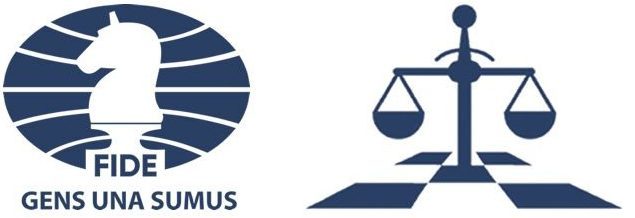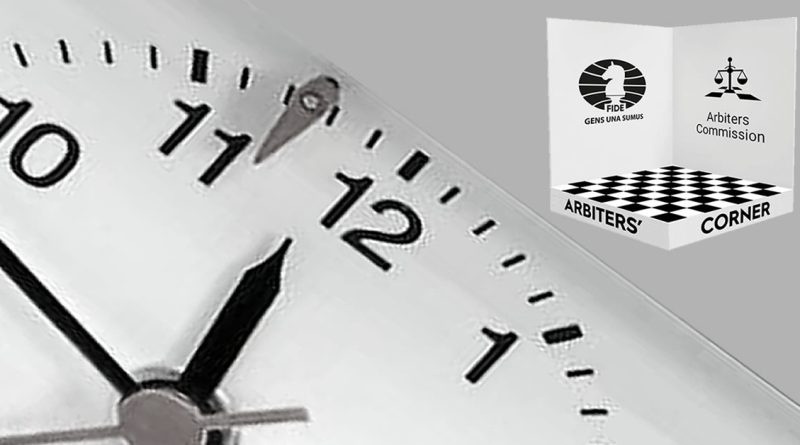How to Avoid Problems, or How to Act to Have Fewer Appeals
IA Ivan Syrovy
I am writing this article in our Arbiters Corner after my previous experiences, not only from the World Rapid and Blitz in Samarkand 2023. The reason why is that there were two appeals, so I am not writing it from the position that I am the one who knows how to avoid them.
Firstly, do not worry. Even if you make the right decision, an appeal can occur, and many times it is not your fault as an arbiter. It is the right of a player to appeal. Our approach to do the best to avoid appeals does not mean that arbiter takes decisions, even knowing that the decision is not correct, just to avoid an appeal. Sometimes it may look so easy – make a decision that no one will appeal (like deciding not to penalise a player; because once I penalise, I can expect the appeal). But if you are sure your decision is correct, you have to make it.
On other hand, there is an area where a good arbiter can avoid an appeal or minimise appeals.
Each arbiter should be aware of the Appeals Committee Procedural Rules (C. 11 in FIDE Handbook). It is important is to emphasise that these procedures apply to appeals in competitions under the aegis of GSC and EVE. Other competitions may opt to apply similar procedures either in part or in full.
To understand how each appeal influences the time schedule I emphasise some articles from the regulation:
3.4 Appeals must be submitted to the AC Chairman in writing within the following timeframes, either after the round or the particular infringement:
3.4.1 1 hour in a standardplay tournament
3.4.2 15 minutes in a rapidplay or blitz tournament
3.7 An appeal may only be made to AC once the appellant has received a decision from the Chief Arbiter. The topics of the appeal may include, but are not limited to:
3.7.1 The arbiter incorrectly applying the FIDE Laws of Chess
3.7.2 The arbiter incorrectly applying the Tournament Regulations
3.7.3 The behaviour of a player
3.9 Upon receipt of an appeal, the AC Chairman is empowered to ask for written statements within a specific timeframe from other people, including but not limited to:
3.9.1 The opponent
3.9.2 The Chief Arbiter
3.9.3 The arbiter who made the original decision
3.10 AC endeavours to:
3.10.1 Communicate its decision in writing as soon as possible after receipt of the appeal.
3.10.2 Find solutions that are within FIDE’s legal framework and the spirit of FIDE’s motto, gens una sumus.
This means:
- Appeals are a big challenge for Rapid and Blitz, where more rounds are to be played on the same day (also for Standard games, if more rounds are to be played the same day and if appeal happens not in the last round of that day).
- Players have the right to appeal. No threat from an arbiter towards the player is possible (e.g. “because of your appeal, you prolonged the beginning of the next round”, or “It will cost you an appeal fee, because in my eyes your appeal is clearly without any reasons”).
- In the regulations, it is not mentioned if the Chief Arbiter can start the next round before Appeals Committee makes a decision. One idea is to include in the regulation article: “If the appeal procedure interferes the tournament schedule, the Chief Arbiter is entitled to decide whether the next round shall be delayed until the decision of the Appeal Committee is announced”.
The Chief Arbiter has to be careful. It would be different to start the next round in the first half of the tournament (like round 6 out of 13) or in the last rounds (11, 12, or 13/13). If the Appeals Committee changes the decision of Chief Arbiter and also the result, it influences the pairings for the round and you can imagine what it makes for pairing for the last round.
Even if we let the Chief Arbiter start the next round before the decision of the Appeals Committee is taken:
- The Chief Arbiter needs some time to take the decision, and make a thorough investigation (5-20 minutes, depending on the case). As mentioned above, a good investigation means a lower chance for a successful appeal. A Chief Arbiter is expected to make a correct decision based on all available evidence.
- If a player has 15 minutes (Rapid and Blitz), we have to wait to see if a player submits the appeal or not. The Chief Arbiter cannot start the round and at the same time ask the player (playing the next round) to submit a written appeal.
- The rounds starts and the Appeals Committee is simultaneously dealing with an appeal.
Here are some of my ideas how to deal with appeals:
- Do not be fearful of an appeal. It does not mean you as an arbiter did anything wrong.
- As a Chief Arbiter or Deputy Chief Arbiter, be well prepared for the event. Do not rely on your experiences, or practice from previous years of that event. Study Laws of chess and other regulations repeatedly, and be well prepared to answer all possible questions regarding the Tournament Regulations, the schedule of the event and others.
- Be nice to everybody, but also strict. Be present in the playing hall – not just physically but mentally as well (do not chat with others, do not focus on other things than the running chess event). Even in such a situation a player is upset and becomes angry, stay calm, listen to the arguments, but never be rude or impolite. You are an arbiter, and you should keep the highest standard of behavior. If player says “you are a weak arbiter”, “arbiters do not understand chess”, then you should not try to take revenge – I do my best, in my eyes this is a correct decision because of this and that.
- Before making your decision as an arbiter, take as much into consideration as possible. Do not hurry – prove that you did your best and you checked all available evidence, so that in the event that an appeal is given, no other evidence is available for the appeals committee. This means that they will most probably take the same decision.
- Explain your decision to the player. If you feel that the player is not happy with your decision, give him/her a more detailed explanation. Even if you know the correct answer, once you feel that the player does not accept it, ask yourself: “What can I do, I see the player is going to appeal?” For example, in a Rapid game player made an illegal move, but the opponent also made his move, and before pressing the clock he realises it. The arbiter did not observe it. You as arbiter arrive later so there is already a dispute, opponent asks you to penalise the player for making an illegal move. You know correct answer (A.5.2 If the arbiter observes an action taken under Article 7.5.1, 7.5.2, 7.5.3 or 7.5.4, he/she shall act according to Article 7.5.5, provided the opponent has not made his/her next move. If the arbiter does not intervene, the opponent is entitled to claim, provided the opponent has not made his/her next move. If the opponent does not claim and the arbiter does not intervene, the illegal move shall stand and the game shall continue. Once the opponent has made his/her next move, an illegal move cannot be corrected unless this is agreed by the players without intervention of the arbiter). What can you do to persuade the player? Show the player the Laws of chess, and the correct article so the player realises you are correct, and you made the only possible decision and there is no chance to be successful with the appeal.
- A good mood during the whole event (and also before) is essential. As an arbiter you cannot influence everything. Act as one team with organisers, Fair Play staff, and other arbiters. Every person is important; even small things can influence the players (sufficient lighting, enough space for players, nice refreshment area). Present yourself during the technical meeting so players feel the event is going to run under your control.
- Little bit of luck – yes you will need it.
P.S. Big thank you to IA Alex Holowczak for his willingness to read my article and for his feedback.
IA Ivan Syrovy

